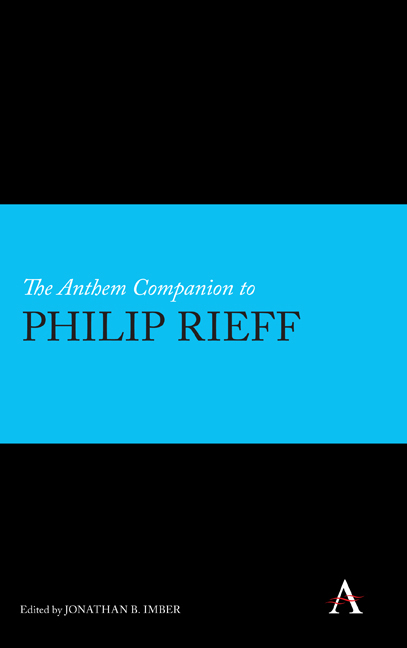Book contents
- Frontmatter
- Contents
- Introduction
- Chapter 1 Philip Rieff: Some Reflections
- Chapter 2 Philip Rieff and the Impossible Culture
- Chapter 3 Philip Rieff as Cultural Critic
- Chapter 4 Philip Rieff as Teacher
- Chapter 5 Prophet v. Stoic: Philip Rieff's Case against Freud
- Chapter 6 Decline and Fall in the Work of Philip Rieff: “I love the old questions” Beckett, Endgame
- Chapter 7 Philip Rieff as Social/ Cultural Theorist
- Chapter 8 Fellow Sons
- Chapter 9 Philip Rieff and Social Theory
- Chapter 10 A Kindly Apocalypse: Philip Rieff and the Endgame of the Therapeutic
- Chapter 11 Disenchantment, Authenticity and Ordinary Charisma
- Writings of Philip Rieff
- List of Contributors
- Index
Chapter 9 - Philip Rieff and Social Theory
Published online by Cambridge University Press: 21 June 2018
- Frontmatter
- Contents
- Introduction
- Chapter 1 Philip Rieff: Some Reflections
- Chapter 2 Philip Rieff and the Impossible Culture
- Chapter 3 Philip Rieff as Cultural Critic
- Chapter 4 Philip Rieff as Teacher
- Chapter 5 Prophet v. Stoic: Philip Rieff's Case against Freud
- Chapter 6 Decline and Fall in the Work of Philip Rieff: “I love the old questions” Beckett, Endgame
- Chapter 7 Philip Rieff as Social/ Cultural Theorist
- Chapter 8 Fellow Sons
- Chapter 9 Philip Rieff and Social Theory
- Chapter 10 A Kindly Apocalypse: Philip Rieff and the Endgame of the Therapeutic
- Chapter 11 Disenchantment, Authenticity and Ordinary Charisma
- Writings of Philip Rieff
- List of Contributors
- Index
Summary
Introduction
On a hot day in the 1960s Philip Rieff was out walking in his trademark threepiece suit, watch chain and bowler hat. An open- topped sports car pulled up with a young woman in the passenger seat. The driver, in T- shirt and shorts, was Erving Goffman, Rieff's departmental colleague at Pennsylvania. When he suggested to Rieff that he must be stifling in ‘that suit’, the latter looked at the woman and said: ‘Professor Goffman is a rich man who dresses like a poor man. I am poor man who dresses like a rich man’. A commentary of sorts on the presentation of self in everyday life, it was also itself a form of self- presentation, the retort to the colleague's joshing directed not at him but at the third party, and expressed through a conversation- stopping, conversation- preventing bon mot. Goffman himself would more likely analyze than use such a form of talk: though he did pepper his own texts with aphoristic expressions, they never stand alone but rather sum up passages of analysis. They also suggest an opening into further thoughts, as when, following discussion the ways in which people avoid embarrassment in the presence of nudity, he tells us that, ‘when bodies are naked, glances are clothed’. As writers, Rieff and Goffman can seem so different from one another that this alone might account for their differing levels of fame and influence. Where Goffman is dialogic and open, so ‘democratic’ that beginning students often take him to be saying something so obvious that they wonder what the fuss is about, Rieff, who should have found a place on ex- wife Susan Sontag's long list of all things camp, once said that there were only 17 people in the world who understood him. While neither characterization is quite right – Rieff's first two books are a reader's pleasure regardless of content, Goffman's essays are far more technical than they first appear, and he often introduced them as ‘reports’ – Goffman remains required reading for us all, while Rieff is a taste that few today acquire. It was not always so: Rieff was influential beyond sociology in the late 1950s and 1960s, then forgotten about by the 1980s, and picked up again around the time of his death in 2006.
- Type
- Chapter
- Information
- The Anthem Companion to Philip Rieff , pp. 149 - 166Publisher: Anthem PressPrint publication year: 2018

